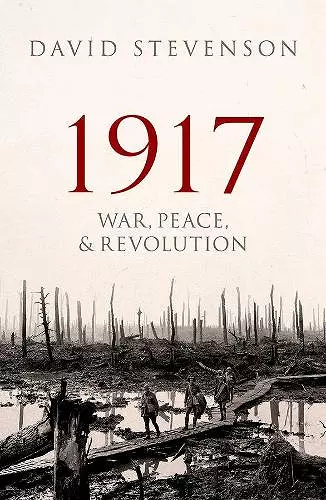1917
War, Peace, and Revolution
Format:Paperback
Publisher:Oxford University Press
Published:25th Jul '19
Should be back in stock very soon

1917 was a year of calamitous events, and one of pivotal importance in the development of the First World War. In 1917: War, Peace, and Revolution, leading historian of World War One, David Stevenson, examines this crucial year in context and illuminates the century that followed. He shows how in this one year the war was transformed, but also what drove the conflict onwards and how it continued to escalate. Two developments in particular--the Russian Revolution and American intervention--had worldwide repercussions. Offering a close examination of the key decisions, Stevenson considers Germany's campaign of 'unrestricted' submarine warfare, America's declaration of war in response, and Britain's frustration of German strategy by adopting the convoy system, as well as why (paradoxically) the military and political stalemate in Europe persisted. Focusing on the abdication of Tsar Nicholas II, on the disastrous spring offensive that plunged the French army into mutiny, on the summer attacks that undermined the moderate Provisional Government in Russia and exposed Italy to national humiliation at Caporetto, and on the British decision for the ill-fated Third Battle of Ypres (Passchendaele), 1917 offers a truly international understanding of events. The failed attempts to end the war by negotiation further clarify the underlying forces that kept it going. David Stevenson also analyses the global consequences of the year's developments, showing how countries such as Brazil and China joined the belligerents, Britain offered 'responsible government' to India, and the Allies promised a Jewish national home in Palestine. Blending political and military history, and moving from capital to capital and between the cabinet chamber and the battle front, the book highlights the often tumultuous debates through which leaders entered and escalated the war, and the paradox that continued fighting could be justified as the shortest road towards regaining peace.
1917 is a triumph by a masterly historian, and one of the most important books to have been published during the centenary years of the First World War. * Gary Sheffield, BBC History Magazine *
1917 will be of great interest to those readers who wish to better understand the broader implications of strategic and diplomatic decisions during the penultimate year of the conflict. It is in that field that Stevenson is an unrivalled master and his comprehensively researched book on 1917 will be welcomed by many. * Robert Gerwarth, Literary Review *
Masterful ... this is a fascinating study of one of the most tumultuous years of the 20th century. * All About History *
A welcome addition to the literature that challenges the all-too-safe and pernicious stereotypes of the history of the First World War that unfortunately still dominate popular culture. * Peter Morgan, Military History Magazine *
1917 is a sound, learned work of breadth and insight, a study of the year 1917 as a microcosm of the war itself. * Wm. Roger Louis, Wall Street Journal *
Stevenson's comprehensively researched and perceptively reasoned analysis stands apart from similar histories by showing that the conflict's outcome was determined not through blind impersonal forces but through deliberate will. * Publishers Weekly, Starred Review *
1917: War, Peace, and Revolution represents a thoughtful synthesis of relevant secondary literature and published primary and archival sources. Its narrative is enriched by an invaluable bibliography, maps and photographs spread throughout the text, and helpful lists of abbreviations and principal personalities. It is a seminal work that will engage and inform students, scholars, and general readers alike. * Gregory J. Dehler, Michigan War Studies Review *
David Stevenson's book is a cool and original account of the heat of war in 1917. It surpasses previous studies in terms of its global range and its archival depth. Here is a history of decision-making by the sleepwalkers who kept on their murky path into war three years after its outbreak, and of those few - including Lenin - who found a way out of the slaughterhouse. Stevenson's is history as tragedy, with hubris bringing down those who thought they could master the destructive forces of the Great War. * Jay Winter, Yale University *
The European nations had dug themselves by 1917 into a war trap seemingly without exit - this is the starting point of David Stevenson's new book. The events of 1917, war, peace, and revolution, the struggle to get out of the war, get here a thorough reassessment. The book is an example for the combination of competent analysis with a gripping narrative and clear judgement. * Holger Afflerbach, University of Leeds *
ISBN: 9780198702399
Dimensions: 234mm x 154mm x 38mm
Weight: 642g
528 pages